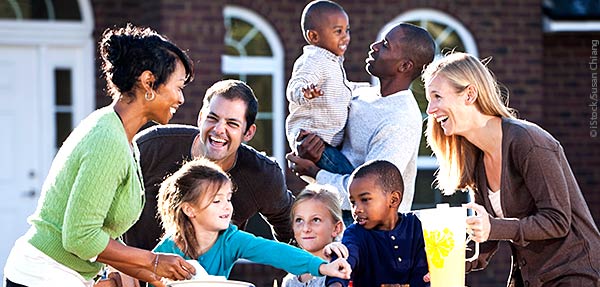We are all familiar with the over used expression “It takes a village to raise a child,” but how many of us believe this and live by this value? As a baby boomer, I grew up in the Fifties in a neighborhood where all the children played together outside after school. The rule was that we had to return home when the streetlights went on; and if we needed something, we could go into several of the neighbors’ houses to use the bathroom or get a quick snack. All the mothers knew us and would attend to our needs as well as discipline as necessary. Our neighborhood had a babysitting co-op, so we all were very comfortable with other parents taking care of us in our home or theirs.
Life for children and parents fifty years later holds little in common with that era. Most neighborhoods are very quiet and empty in the afternoons as both parents work and children attend activities. Childcare is usually provided by professionals and families don’t have opportunities to interact with friends and neighbors in an unplanned, casual way. Parents aren’t learning about the quirks and personalities of other children as often as they once did. And many children are deprived of the guidance and wisdom that adults who are not their parents can provide.
Children learn coping skills and resiliency from other adults who care about them. They learn about differing value systems, religious beliefs, rituals, and traditions by spending time with people outside their families. This leads to tolerance, but also contributes to self-confidence, creativity, and willingness to take risks and live outside their comfort zone. These are important qualities for children to develop in today’s world that is most notable for its pace of change.
As parents or grandparents of children today, we cannot even begin to imagine what their world will look like when they grow up. All we can do is provide them with a sense of being connected to others — a sense of greater purpose outside themselves — and the compassion that will be necessary to navigate this evolving landscape and to make a contribution.
I propose to parents that we make an effort to create a larger community for our children, outside of structured activities. This will require commitment to the belief that your children need opportunities to casually hang out with other families on a regular basis as much, if not more, than they need music lessons, a second language, or sports teams. While it can be a challenge to create or find community within the constraints of our fast-paced, high-pressure, never-enough-time culture, it is well worth the effort.
Make time to get to know neighbors with or without children and see if you can coordinate regular get-togethers. Be willing to organize a pot-luck, games and activities on the street or at the park, or a field trip to the beach. Reach out to other families that may have similar interests or sensibilities. Their children may attend your childcare center, school, sports team, youth group, or girl/boy scouts. Join a synagogue, church, volunteer group, or the YMCA.
Joining or creating new groups often requires us to step out of our comfort zone, not to mention shift our priorities in our daily and weekly lives. We may need to give up some activities we feel are important and replace them with a very different type of experience. But when we push ourselves to embrace other families and their children and to learn about differences, our lives are enriched exponentially and we give a gift to our children that will result in a life-long sense of deep connection to their community and world, and the motivation to make a difference to others.
Karen Friedland-Brown, MA, is the Director of Parents Place on the Peninsula.



